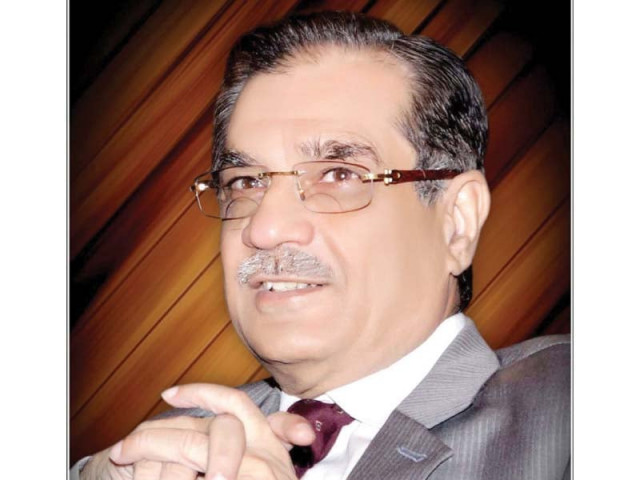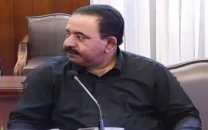The mixed legacy of CJP Nisar
Senior PTI leader believes attacks against judiciary would only bring establishment, civilian govt closer

The conviction of former prime minister Nawaz Sharif and his daughter Maryam Nawaz continues to riddle former chief justice of Pakistan Saqib Nisar by political controversies, continuously dragging him to the political thicket.
Nisar, who continues to enjoy wider support within the judiciary, with the Supreme Court Bar Association President Ahsan Bhoon also backing him in all kinds of circumstances.
However, amidst the political storm and criticism, a senior PTI leader nonetheless said that such controversies would only bring the establishment and civilian government even closer. The government functionaries have persistently maintained that the political rival is attacking the judiciary in order to substantiate its own narrative.
On the other hand, the controversy has also stirred hand-wringing within the legal fraternity itself as lawyers are urging the Chief Justice of Pakistan Gulzar Ahmed to summon a meeting of the full court to discuss the issue.
Pre-2017 CJP
Top jurists believe that Justice Nisar has left behind two conflicting legacies. On the one hand, he is notoriously remembered for his ‘unprecedented judicial activism' and outreach. He is painted as an arrogant and somewhat ‘imbalanced’ judge who worked hard for the enforcement of fundamental rights.
Also read: IHC won’t 'hesitate' in acting against ex-CJP Nisar
Meanwhile, on the other hand, another version of his legacy dates back to his tenure prior to the year 2017 when he strictly applied laws, rules and regulations, and gave landmark verdicts on law points, which will be cited in law books.
A quick review of his tenure and decisions brings to light the outcomes of his judgements and how they have been interpreted by political contradictions.
Interestingly, former CJP Nisar was not part of the bench which disqualified Nawaz Sharif as a lawmaker under Article 62 (1) (f) of the Constitution. Soon after taking oath as CJP, Pakistan Tehreek-e-Insaf (PTI) supporters had launched a campaign against Saqib Nisar, calling him a 'PML-N judge' on the grounds that he had preferred not to be part of the larger bench hearing Panamagate.
During the hearing of PML-N leader Hanif Abbasi petition seeking disqualification of PTI chief Imran Khan and Jahangir Tareen, Nisar gave a tough time to the counsels of both PTI leaders.
However, in December 2017, former CJP Nisar declared Imran Khan as ‘Sadiq and Ameen’. But Tareen was disqualified under Article 62 (1) (f) of the constitution.
In the meanwhile, the PMLN leadership was criticising judges on account of Nawaz Sharif disqualification.
In December 2017, ex CJP Nisar responded to the PML-N attack against judges and urged them that the judiciary is like 'baba' (grandfather). Therefore, they should respect it.
Later, Nisar visibly changed his approach in the last year of his tenure and started a unique’ judicial activism, which was completely different from what he did as a superior court judge throughout his 20-year career.
It is also a fact that his judicial activism had overshadowed his previous pro-executive and pro-parliament approach which was also characterized by judicial restraint. Many lawyers describe his judicial activism as a ‘U-turn’ in his approach.
Before 2017 Justice Nisar had believed in political-constitutional supremacy. But he later emerged as a believer in judicial-constitutional supremacy.
Also read: If Nawaz can go to jail, why can't Nisar: ex-PM Abbasi
He had been pro-executive throughout his career but in his last year, he became sceptical about the powers of the executive. He had been sceptical about the public interest litigation under Article 184 (3) of the Constitution but became a strong proponent of exercising suo motu powers.
As a judge, he had been a non-believer in the basic structure theory of the Constitution and always put faith in the supremacy of parliament. But later, he started saying the Constitution is supreme, which is to be interpreted by the apex court.
Till 2017, Justice Nisar was believed to be a pro-Pakistan Muslim League-Nawaz (PML-N) judge who preferred not to head a larger bench that heard the Panamagate case. But that image underwent a drastic shift when he was openly criticised as a judge who harboured a bias against PML-N.
Till 2017, Justice Nisar was known as a judge who gave a proper opportunity of hearing to lawyers but in his last year, many senior lawyers avoided appearing before him due to his allegedly rude conduct. Harsh words were also exchanged between Justice Nisar and top attorneys during this year.
He was visibly tough on politicians, media men and top officials. However, no visible change was witnessed in his approach towards the military establishment, which is why one section accused him of weakening civilian supremacy. However, another section believed that he exposed the corruption of the political elite.
Perhaps it was the first time in the judicial history of Pakistan that a CJP heard cases also on weekends. Water, health, education and population control were his main priorities. Likewise, the CJP conducted unique proceedings in public interest matters at the Lahore Registry.
Justice Nisar not only adjudicated matters related to the public interest but also visited different hospitals, jails etc. He also started a campaign to collect funds for the construction of dams. Despite reservations, people appreciate him for highlighting the issue of water shortage in the country.
Last year, courtroom No 1 always remained packed during hearings of high profile cases, in which several politicians, civil servants and common people appeared.
Also read: IHC takes notice of accusations against former CJP Saqib Nisar
Justice Nisar’s elevation to the SC was a dramatic one. The Pakistan Peoples Party (PPP) led government had appointed him as the LHC chief justice and elevated Khawaja Sharif to the apex court without the consent of the former CJP Iftikhar Chaudhry.
However, Justice Nisar refused to become the LHC chief justice. Subsequently, the PPP government withdrew its decision and directly elevated him to the SC with the consent of the CJP.
During Justice Iftikhar era (2009-13), when the judiciary was assuming powers of all other institutions, Justice Nisar had raised a voice of dissent.
Unlike other judges, Justice Nisar wanted to set parameters for public interest litigation under Article 184 (3) of the Constitution but unfortunately, he also exceeded jurisdiction as the CJP.
Several questions were raised about the composition of benches in high profile cases during his tenure.
It was being alleged that Nisar always preferred to include 'like-minded judges' in the benches hearing sensitive matters.
Some judges openly opposed the exercise of public interest jurisdiction by him.
Last year, courtroom No 1 always remained packed during hearings of high profile cases, in which several politicians, civil servants and common people appeared.
On February 18, 2010, he was elevated to the Supreme Court and took oath as the CJP on December 3, 2016. His career as an SC judge can be divided into different phases.
Justice Nisar’s elevation to the SC was a dramatic one. The Pakistan Peoples Party (PPP) led government had appointed him as the LHC chief justice and elevated Khawaja Sharif to the apex court without the consent of the former CJP Iftikhar Chaudhry.
Also read: Ex-CJ terms audio clip favouring Sharif ‘fabricated’
However, Justice Nisar refused to become the LHC chief justice. Subsequently, the PPP government withdrew its decision and directly elevated him to the SC with the consent of the CJP.
When a 17-judge full court took up the 18th Amendment case in 2010/11, only Justice Nisar and Justice Asif Saeed Khosa openly endorsed the constitutional amendment about changing the procedure of judges’ appointment.
Due to their opposition, Justice Chaudhry had referred the matter to the parliament with few recommendations to change the procedure of judges’ appointment. Likewise, despite the opposition of then CJP, Justice Nisar had also written dissenting notes in judges’ pension cases.
In the 21st Constitutional Amendment case, Justice Nisar wrote that the ‘basic features’ doctrine should not be adopted and made part of the constitutional law of Pakistan. He said the ultimate power should flow not from the pens of judicial appointees, but from the elected representatives of the people of Pakistan.
“A powerful judiciary is not necessarily an independent judiciary. And conversely, an independent judiciary is not necessarily a powerful judiciary,” he had noted.
However, his approach visibly changed last year, when he did not endorse the parliament’s law, which paved way for Nawaz Sharif to head his party after his disqualification. He headed the larger bench which supported lifetime disqualification of lawmakers under Article 62 (1) (f).
Later, suo motu was taken on the victory of senators, who were holding dual nationalities. The matter remained pending for several months. In October 2018 when the PTI got the majority in Punjab, the apex court disqualified two PML-N senators Haroon Akhtar and Sadia Abbasi for holding dual citizenship.
Also read: Fawad warns PML-N against ‘targeting’ judiciary, army
After their disqualification, the PTI was successful in getting both seats. Contrary to the Election Act 2017, the apex court on June 5, 2018, restored almost all information omitted in the nomination forms approved by parliament.
Justice Nisar also gave hard time to politicians. All chief ministers and some ministers were summoned by him. Unlike his predecessors, Justice Nisar did not hesitate to summon political leaders over matters relating to bad governance.
Several lawmakers and media men like Punjab Chief Minister Usman Buzdar, Senator Azam Swati, Amir Liaqat, Dr Shahid Masood, Arshad Sharif and Mir Shakil Rehman threw themselves at the mercy of court by tendering unconditional apologies in different matters.
Justice Nisar remained almost consistent in his approach to the military establishment during his tenure as the top judge. Though he focused on the enforcement of fundamental rights last year, he could not resolve the missing persons’ issue.
The SC’s 2010 verdict in the Macro Habib case could not be implemented. Asghar Khan case is still pending. His opponents always propagated that he had some understanding with the military establishment. However, he asked the Inter-Services Intelligence (ISI) to vacate a road at Abpara Islamabad.



















COMMENTS
Comments are moderated and generally will be posted if they are on-topic and not abusive.
For more information, please see our Comments FAQ